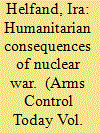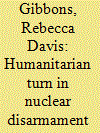| Srl | Item |
| 1 |
ID:
171178


|
|
|
|
|
| Summary/Abstract |
The making of the Treaty on the Prohibition of Nuclear Weapons (TPNW) has put Austria and its involvement in nuclear disarmament in the spotlight. This study highlights several factors that led Austria to become a prominent voice in nuclear-disarmament debates. First, its involvement dovetails with the emphasis on humanitarian disarmament it has promoted since the 1990s. Second, a strong antinuclear identity pervades Austrian society. This “nuclear allergy” combines antimilitarism inherited from the Cold War and, more broadly, an aversion to nuclear power, including for energy purposes. These two considerations form the background to the increased activism of the Austrian Foreign Ministry on nuclear disarmament in international fora. But, equally, Austria’s crusade for the TPNW can be attributed to the engagement of a small team of diplomats implementing personal as well as national preferences in favor of disarmament.
|
|
|
|
|
|
|
|
|
|
|
|
|
|
|
|
| 2 |
ID:
128059


|
|
|
|
|
| Publication |
2013.
|
| Summary/Abstract |
In March, 130 nations gathered in Oslo for a two-day conference on the humanitarian consequences of nuclear war. The five countries that the nuclear Nonproliferation Treaty (NPT) recognizes as nuclear-weapon states staged a coordinated boycott, arguing that a meeting that discussed what will actually happen if nuclear weapons are used would somehow distract them from the important initiatives they are pursuing to lower the number of nuclear weapons that they possess. Next February, there will be a follow-up conference in Mexico to further delineate the medical effects of nuclear war as they are now understood and to consider the circumstances under which nuclear war might occur. Far from being a distraction, these meetings are helping to create the conditions necessary for the elimination of nuclear weapons. The United States and the four other NPT nuclear-weapon states should participate in the Mexico conference and actively promote the process launched in Oslo to educate policymakers and the general public about the catastrophic humanitarian consequences of nuclear war. This task is particularly urgent in view of the new data that have emerged over the last few years. This information indicates that even a very limited nuclear war, confined to one region of the globe, would have devastating effects worldwide.
|
|
|
|
|
|
|
|
|
|
|
|
|
|
|
|
| 3 |
ID:
160980


|
|
|
|
|
| Summary/Abstract |
On July 7, 2017, at the UN General Assembly, 122 states voted to adopt the Treaty on the Prohibition of Nuclear Weapons. This was the culmination of the work of a global network of states and grassroots activists that emphasized the devastating humanitarian consequences of nuclear-weapons use in order to delegitimize their possession. Advocates of the ban treaty are frustrated with the slow pace of nuclear disarmament through traditional channels. This article traces the history of the ban movement from 2005 to the present. It concludes by highlighting six factors that led to the successful adoption of the treaty: a small group of committed diplomats; an influx of new coalition members; the contribution of civil society; the reframing of the narrative surrounding nuclear weapons; the pursuit of a simple ban treaty; and the context provided by the Barack Obama administration.
|
|
|
|
|
|
|
|
|
|
|
|
|
|
|
|